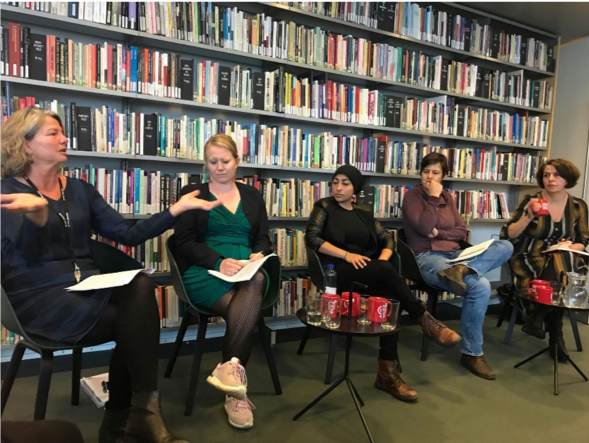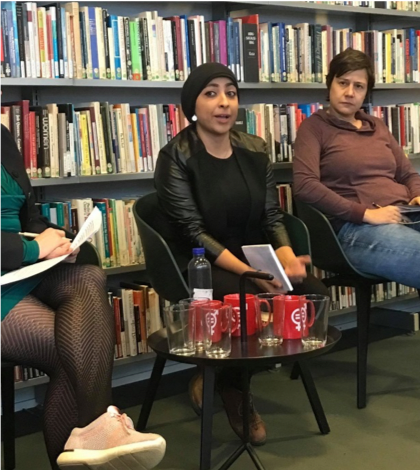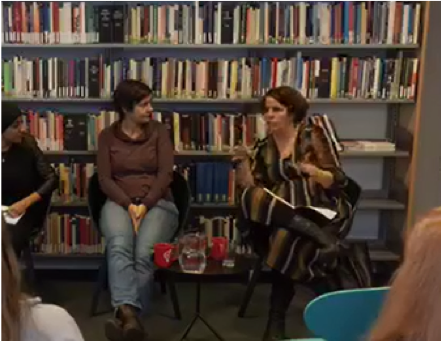Take-aways: How LGBTIQ+ and women’s rights activists are affected by shrinking civic space
On October 31st 2018, KVINFO in cooperation with LGBT Denmark, Amnesty International and Global Focus hosted the third in a series of events concerning civic space. The event was structured as a panel discussion on how shrinking civic space affects LGBTIQ+ and women’s rights activists and was moderated by Lene Steffen who is the international director of KVINFO.
The panel consisted of:
- Azza Soliman, WHRD, Egypt (via video message)
- Maryam Al-Khawaja, WHRD, Bahrain, vice chair of the board of directors Urgent Action Fund
- Susanne Branner, project manager, LGBT Denmark – LGBTIQ+ activist with experience from Uganda, Tanzania
- Helle Jacobsen, project manager gender, Amnesty International, experience from research and working with LGBTIQ+ rights and women’s rights globally as well as in Denmark.
- Henriette Laursen, director, KVINFO
Human Rights and (Danish) double standards
 One of the recurring themes throughout the panel discussion was the growing tendency of governments applying double standards in their attitudes and actions concerning human rights. Though Denmark may be perceived as a utopia compared to many other countries when it comes to the preservation and protection of civil and human rights, there are still problems with the way that the Danish government engages with these topics in everyday politics. The Danish government has sought to promote itself as a champion of women’s rights and human rights in general, as part of an effort to gain membership of the United Nations Human Rights Council in 2019-2021. Yet on multiple occasions the Danish government has rejected asylum to LGBTIQ+ activist from Iran and other countries where sexual minorities face harsh conditions and risk torture and killing.
One of the recurring themes throughout the panel discussion was the growing tendency of governments applying double standards in their attitudes and actions concerning human rights. Though Denmark may be perceived as a utopia compared to many other countries when it comes to the preservation and protection of civil and human rights, there are still problems with the way that the Danish government engages with these topics in everyday politics. The Danish government has sought to promote itself as a champion of women’s rights and human rights in general, as part of an effort to gain membership of the United Nations Human Rights Council in 2019-2021. Yet on multiple occasions the Danish government has rejected asylum to LGBTIQ+ activist from Iran and other countries where sexual minorities face harsh conditions and risk torture and killing.
In relation to this it was discussed that it is highly problematic when the Danish government actions legitimise violations of human rights, such as the selling of weapons and sophisticated surveillance equipment to oppressive regimes like Saudi Arabia, who rank among the gravest violators of human rights globally.
Amnesty International has conducted research on intersex rights and the worrisome legal pull-backs made by European governments. In Denmark these pull-backs combined with the requirements of the Danish Health Authority concerning recognition of intersex identities – and their access to medical treatment – are similar to the developments spearheaded by the Trump administration in the United States, in that the Danish government and the Danish Health Authority are employing the highly discriminatory concept of ‘biological sex’ - providing additional barriers for the legal recognition of intersex people.
 “Human rights and human rights defenders were ‘sexy topics’ in the wake of the Arabic spring, but now government officials openly respond with indifference by saying “why should I care?” when asked to engage with the human rights agenda.” – Maryam Al-Khawaja
“Human rights and human rights defenders were ‘sexy topics’ in the wake of the Arabic spring, but now government officials openly respond with indifference by saying “why should I care?” when asked to engage with the human rights agenda.” – Maryam Al-Khawaja
Acting in solidarity
Another recurring theme was the lack of unitary action and solidarity in times when CSOs face crackdowns by governments. When for instance organisations working with sexual minorities in foreign countries face restrictions by the local governments that either seek to silence them or throw them out of the country, the CSO sector should stand together and appeal to their own governments to put pressure on the governments responsible for the violations. The panel participants all agreed that this lack of solidarity is a direct result of the increasing structural restrictions that CSOs face globally, which put pressure on the individual organisations who must compete for funding and legitimacy.
It was also discussed that a way for civil society to mobilise such tangible solidarity would be to create an emergency fund that would permit other organisations within the country to channel funding to the partners of organisations who have been expelled from operating within that country.
“LGBTIQ+ activists in countries where like Saudi Arabia, Nigeria and Tanzania need to have quick access to means of relocation or going underground when they are threatened by either the government or hate groups.” – Susanne Branner

The participants all agreed that tangible solidarity between CSOs is of critical importance, but they also stressed the notion that the governments have a responsibility to protect and promote enabling environments for civic space. Thus, the increasing restrictions on civic space that we are seeing globally actually presents a unique opportunity for the Danish government to jump in the human rights vanguard and live up to their international statements with tangible efforts aiming empower and legitimise CSOs who are facing restrictions.
“The Danish government should be our allies and stand up for the agendas that we as CSOs fight for, especially when it comes to agendas such as gender equality and LGBTIQ+ rights, which are considered highly controversial in some countries.” – Henriette Laursen
- Oprettet den .

